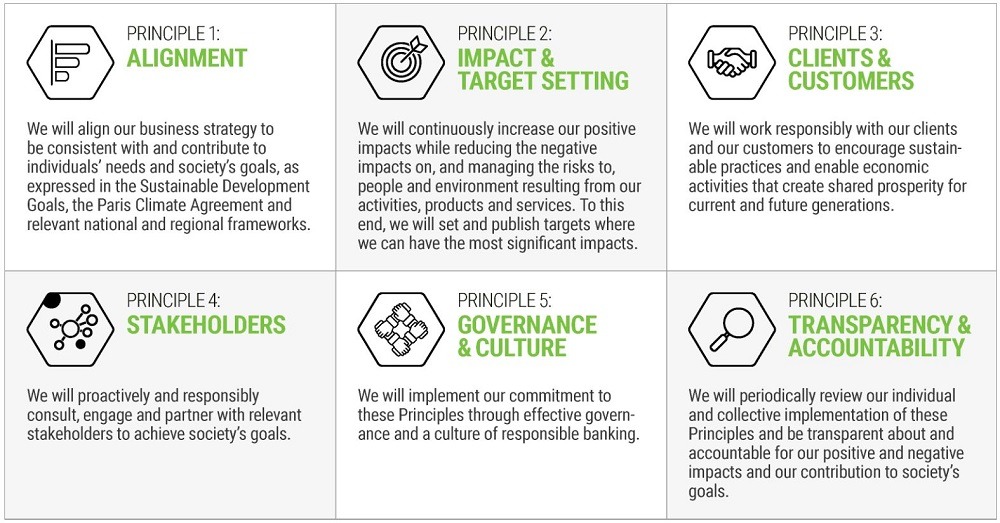
Next week, the bosses of major banks around the world will be in New York to sign the Principles for Responsible Banking charter as part of the United Nations (UN) Environment Programme.
More than 45 CEOs will join the UN Secretary-General at the launch ceremony, which will take place as part of the 74th Session of United Nations General Assembly (UNGA).
The Principles are designed to provide the “framework for a sustainable banking system”, and to “accelerate the banking industry’s contribution” to achieving the sustainability goals set out by the Paris Climate Agreement and the UN’s Sustainable Development Goals.
A core group of 30 founding banks led the development of the Principles, which comprise six individual commitments to achieving key UN sustainability targets – while around 130 institutions have joined up to the scheme.
Martin Skancke, the board chairman of the UN’s existing Principles for Responsible Investment (PRI) association, said: “The PRI has helped drive the integration of environmental, social and governance considerations into investor decision-making.
“It is now time for the banking sector to step up in both assessing the risks it is exposed to, and the impacts of its financing activities in realising the sustainable development goals.”
We take a closer look at the Principles for Responsible Banking initiative ahead of its official launch next week.
Principles for Responsible Banking form part of the UN’s Environment Programme – Finance Initiative
The Principles for Responsible Banking are part of the United Nations Environment Programme – Finance Initiative (UNEP-FI).
The UNEP-FI was created following the UN’s 1992 Earth Summit as a means to promote sustainable finance around the world through partnerships and co-operation within the industry.

It is made up of more than 250 financial institutions – including banks, insurers, and investors – which have each signed up to a statement of commitment on the integration of environmental and social considerations into their operations.
The commitment states: “We members of the financial services sector recognise that economic development needs to be compatible with human welfare and a healthy environment.
“To ignore this is to risk increasing social, environmental and financial costs.
“We further recognise that sustainable development is the collective responsibility of governments, businesses and individuals.
“We are committed to working collectively toward common sustainability goals.”
Broadly speaking, the UNEP-FI’s work within the banking industry comprises technical research and guidance, leadership initiatives and promoting policy dialogue and engagement.
It covers issues such as climate risk, natural capital risk, human rights and positive impact finance.
The six Principles for Responsible Banking
A group of 130 signatory banks will pledge their commitment to the six Principles at the launch ceremony in New York next week, representing a value of more than $47tn across 49 countries.
The individual commitments cover alignment of strategy with UN sustainability goals, impact and target setting, working with clients and customers, engagement with stakeholders, responsible governance and culture, and transparency and accountability.

Some of the world’s biggest and most influential banks will sign up to the Principles, including the likes of ABN-AMRO, Barclays, BNP Paribas, Citi, Deutsche Bank, ING, Lloyds Banking Group, MUFG, Royal Bank of Scotland and Santander.
BNP Paribas CEO Jean-Laurent Bonnafé said: “This initiative is the first in which such a large, global coalition of banks has committed to align their business strategies to the UN’s Sustainable Development Goals and the Paris Climate Agreement.
“The Principles represent an important, collective step forward which will enable us to take further action on climate change and build a more sustainable and inclusive economy.”
Banco Santander executive chairwoman Ana Botín added: “Every business has a responsibility to tackle today’s global challenges.
“At Santander we’ve worked together to deliver profit with purpose – ensuring that our day-to-day operations help more people and businesses prosper in a sustainable way.
“We have ambitious targets for areas like financial empowerment, green finance, and gender diversity among others.
“And now we need to do more by collaborating, sharing best practice, and encouraging more businesses and individuals to act in a responsible way to the benefit of all.”






